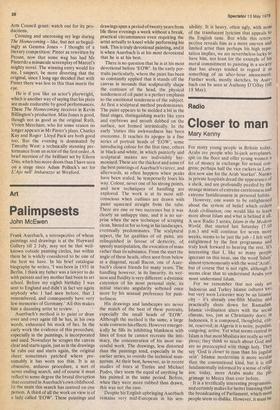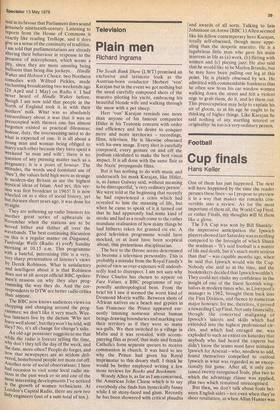Radio
Closer to man
Mary Kenny
For many young 'people in Britain today, Arabs are people who hi-jack aeroplanes, spit on the floor and offer young women a lot of money in exchange for sexual congress; perhaps half the vice rackets in London now aim for the Arab 'market'. Nurses in private hospitals dread the appearance of a sheik, and are profoundly puzzled by the strange mixture of extreme carelessness and extreme fastidiousness in personal habits. However, one wants to be enlightened about the system of belief which orders Arab civilisation; one would like to learn more about Islam and what is behind it all. A new Radio 3 series, /s/am in the Modern World, that started last Saturday (7.10 p.m.) and will continue for seven more weeks, seems to be just the job — I felt very enlightened by the first programme and truly look forward to hearing the rest. It's interesting that I, like so many people ignorant on this issue, use the word 'Islam' almost synonomously with the word 'Arab', but of course that is not right, although it seems clear that to understand Arabs you must understand Islam.
For we remember that not only are Indonesia and Turkey Islamic cultures too; but very soon Leicester may be an Islamic city — it's already one-fifth Muslim and practically shuts down for Ramadan. Islamic civilisation alters with the social climate, too, just as Christianity does; in Indonesia, it is composed, thoughtful, elitist, reserved; in Algeria it is noisy, populist, outgoing, active. Yet what seems central to Islam is that most Muslims are really so verY pious; they think so much about God and are so preoccupied with things holy. They say 'God is closer to man than his jugular vein'. Islamic modernism is more secular than the conventional kind, but it is still fundamentally informed by a sense of religion; today, more Arabs make the pilgrimage to Mecca than ever before. It is a terrifically interesting programme, and certainly makes for better listening than the broadcasting of Parliament, which most people seem to dislike. However, it must be said in its favour that Parliament does sound genuinety nineteenth-century. Listening to reports from the House of Commons is exactly like reading Trollope, and it does give us a sense of the continuity of tradition. I am told that parliamentarians are already altering their behaviour in response to the Presence of microphones, which seems a Pity, since they are more amusing being buffoons than being disc jockeys. Hindle Wakes and Hobson's Choice, two Northern Comedies with Wilfred Pickles, made enchanting broadcasting two weekends ago (29 April and 1 May) on Radio 4. I had never heard of Hindle Wakes before, though I am now told that people in the North of England took it in with their Mothers' milk. What was so absolutely extraordinary about it was that it was so Preoccupied with themes one has almost forgotten existed as practical dilemmas; honour, duty, the overweening need to do What is expected of one. It is all about a Young man and woman being obliged to Marry each other because they have spent a Weekend 'as man and wife'; there is no question of any pressing matter such as a Pregnancy; it is a point of honour. The attitudes, the words used (constant use of 'thee'), the values held high were as strange to modern-day Britain as are the highest Mystical ideas of Islam. And yet, this version was first broadcast in 19651 It is now Wheeled on as a slice of social history, yet but thirteen short years ago, it was done for str aight.
They are softening up radio listeners for another great series of upheavals in November when the stations are to be Moved hither and thither all over the wavebands. The best continuing discussion on this is a regular matter on Disgusted, Tunbridge Wells (Radio 4) every Sunday morning at 10.15 a.m. This programme
With a hateful, patronising title is a very, very sharp presentation of listener's views by Derek Robinson. What is satisfactory and intelligent about it is that Robinson does not at all accept official BBC spokesmen's reasons on why they alter prog ramming the way they do. And the correspondents to DTW are better radio critics than anyone.
The BBC now knows audiences views on Chopping and changing around the prog rammes; we don't like it very much. Wire
less listeners live by the dictum 'Why not leave well alone', but they won't be told, will
they? No, it's all change for change's sake.
An old-age pensioner suggests to me that While the radio is forever telling the time, Why don't they tell the day of the week, and the date, more often? People do forget, and rio‘v that newspapers are so seldom deli vered, homebound people are more cut off. Another note of social observations: I have had occasion to visit some local radio sta tions in the past week or so and one of the
!bog interesting developments I've noticed IS the growth of women technicians. At London's Capital Radio, there are now two lady engineers (out of a sum total of ten.).



































 Previous page
Previous page